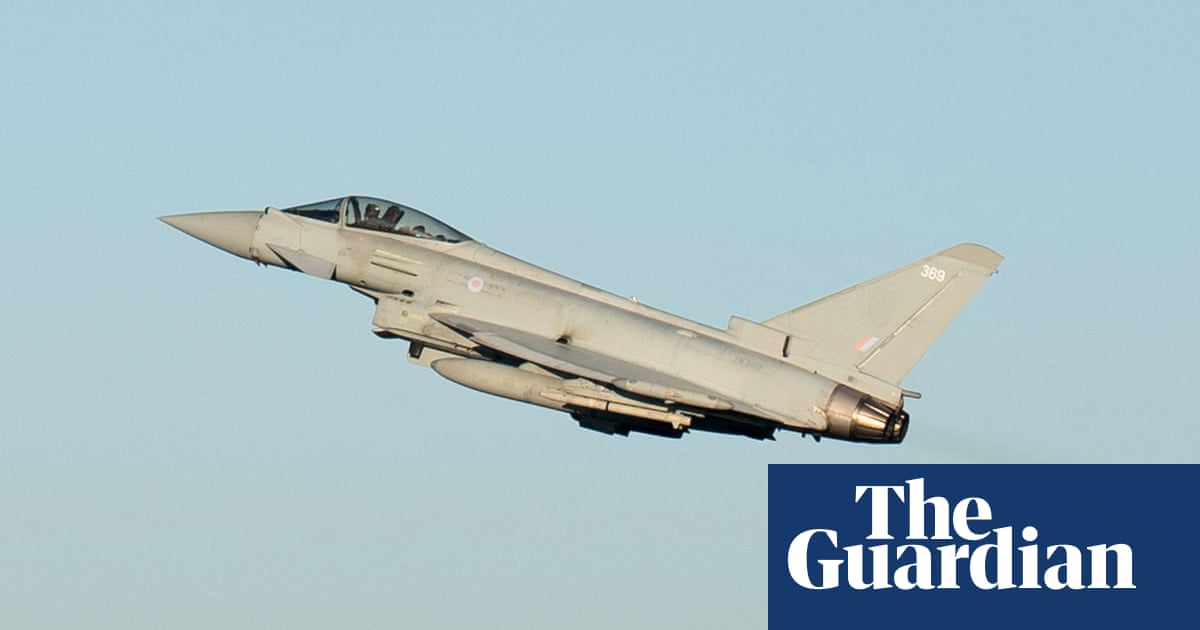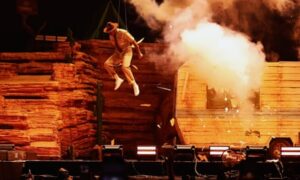
Rishi Sunak has confirmed that RAF Typhoons shot down a number of Iranian drones overnight and said the UK’s involvement helped save lives in Israel and neighbouring Arab countries.
The prime minister did not provide the number of drones hit, although the UK’s contribution is likely to have been significantly less than the 70 claimed by the US and dozens reported knocked out by Jordan over its airspace.
“I can confirm that a number of Iranian attack drones were shot down and we pay tribute to the bravery and the professionalism of our pilots flying into the face of danger to protect civilians,” Sunak said.
Britain signed a military cooperation agreement with Israel in 2020, which remains secret, and a defence and trade pact a year later, but these are not thought to require the UK to come to Israel’s aid in the event that it is attacked by another country.
Instead, Sunak described Britain’s participation as “saving lives not just in Israel but in neighbouring countries like Jordan as well”, and he suggested it was an extension of the air campaign against Islamic State in Iraq and Syria.
Constitutionally, the prime minister can start a war or order military action without reference to parliament, relying on royal prerogative powers originally reserved to the monarch but now delegated to ministers.
In 2011 the Conservative-led coalition said a convention had emerged whereby MPs would have the opportunity to debate the deployment of military forces in advance, except in the case of an emergency.
Parliament’s authorisation was sought for the UK to participate in the bombing against Muammar Gaddafi’s forces in Libya in 2011, against IS in Iraq in 2014 and in Syria in 2015, but more recently Sunak declined to give parliament a vote on Britain’s participation in strikes against Yemen’s Houthis, who have been attacking shipping in the southern Red Sea and Gulf of Aden.
Parliament returns from its Easter break on Monday, having not sat since the US first warned of a likely Iranian attack on Israel at the end of last week. The prime minister is expected to personally update MPs on the crisis and Britain’s military assistance on Monday afternoon.
Ministers are likely to face renewed pressure from Tory MPs to proscribe Iran’s Islamic Revolutionary Guards (IRGC) as a terrorist group.
“I have argued for a long time that they should already be proscribed because of their actions inside and outside Iran,” Liam Fox, the former Tory defence secretary, told the Guardian. “Recent events have merely confirmed what many of us believe – that they are the toxic core of a thuggish regime. We might also ask why Iran Air are still operating daily from Heathrow and why Iranian banks still function in the City.”
Bob Blackman, the Tory MP for Harrow East, said: “Iran has declared war on Israel and Israel is our ally. We should proscribe the IRGC, sequester their assets in the UK and close the Iranian embassy in London.”
The shadow foreign secretary, David Lammy, renewed the Labour party’s call for the IRGC to be proscribed and called for the government to “come forward with new plans” to make it happen.
The Foreign Office has resisted the move because doing so with a state body would be likely to sever diplomatic relations with Tehran and prevent direct engagement.
Victoria Atkins, the health secretary, told the BBC’s Laura Kuenssberg Show: “We believe that the police or security services and the courts here in the UK have the powers that they need to target those people who are causing the most concern and indeed, we have sanctioned 400 individuals and entities from Iran here in the UK.
“But secondly, there is a point of the value of being able to have a direct conversation with the Iranian authorities, in the way that has already happened.”
Preparations for the UK’s participation in the event of any Iranian attack went on for several days last week, with Typhoons and Voyager refuelling aircraft being rebased at the Akrotiri airbase in Cyprus to provide the necessary support.
Sunak said he had agreed “a plan of action” on Friday at a meeting of the Cobra emergency committee, where senior ministers and officials would have been present.
RAF Typhoons also covered planned US Air Force missions over Iraq and Syria, allowing the Americans greater latitude in helping Israel’s military, defence sources said.
Source: theguardian.com


















